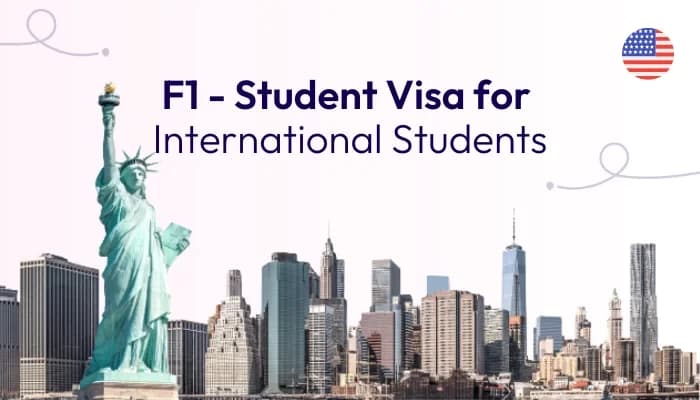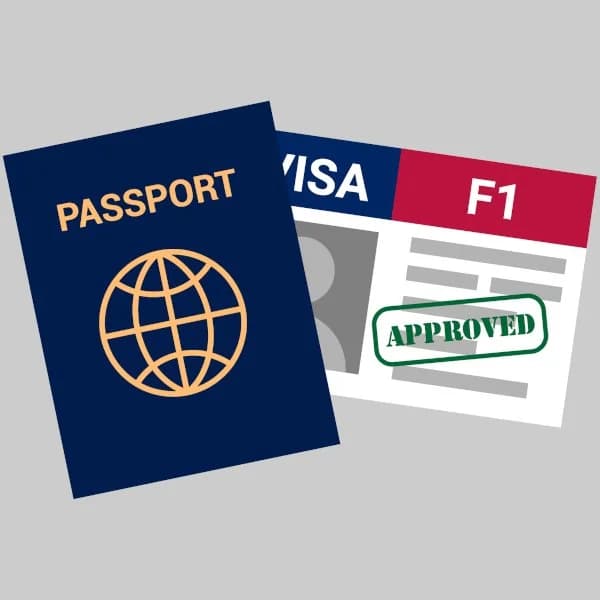Top 50 F1 Visa Interview Questions and Answers with Tips 2025

The F1 visa interview can feel like the final boss in your study abroad journey—but it doesn’t have to be difficult! Think of it as a chance to share your excitement and plans for studying in the U.S. This blog packs the top 50 F1 visa interview questions with tips to help you answer confidently and authentically. From tricky questions about your finances to explaining why you picked your program, we’ve got you covered. Let’s turn that nervousness into confidence and get you ready to impress!
1. General Background and Study Intentions
1. Why do you want to study in the US?
Answer: The US education system is renowned for its emphasis on innovation, research opportunities, and diverse student populations, which I believe will help me gain a global perspective in my field.
Tip: Make it clear that you’re not going for the burgers and fries—Express excitement about the unique opportunities for academic and personal growth in the U.S.
2. Why did you choose this specific university?
Answer: I chose Winona State University because of its strong program in Computer Science, which is ranked among the top in the US. The university also offers state-of-the-art research facilities such as Mortor Cyber Lab and AI lab for hands-on experience, which are essential for my career goals. Additionally, the location of the university is ideal, as it is close to companies and industries where I can gain internships and build a professional network during my studies.
Tip: Talk about what caught your eye—program quality, location, or that irresistible campus view (but mostly the academic programs). Know at least 3 - 4 key features of the university which attracted you to make a good impression on visa officer.
3. Why did you choose this program?
Answer: I chose this course in Cybersecurity because it’s essential for the future of technology and business. With the rise in cyber threats, the demand for professionals in this field is growing. I want to specialize in this area so I can help companies protect their data. The program at Kansas University is known for its hands-on approach, with a strong focus on practical skills through labs and internships. Their partnership with leading tech companies will allow me to gain real-world experience, making it the perfect choice for my career.
Tip: Explain how your passion for the subject and its relevance to your career path makes this the perfect choice. Have a good knowledge about the course so you can answer cross-questions by visa officer.
4. Why are you pursuing this degree at this point in your career?
Answer: After gaining practical experience in computer engineering [your field], I’ve realized that to reach the next level in my career, I need advanced training and skills in cyberspace, which this degree will provide.
Tip: No, it’s not a midlife crisis! Show that your timing is perfect for the next big step in your career. And,
5. How did you find out about this university?
Answer: I found this university through extensive research, rankings, and reviews, and it stood out because of its strong reputation in biology.
Tip: Give credit where it’s due—mention how your research led you there, or if Uncle Google played matchmaker.
6. What are your plans after completing your studies?
Answer: After graduation, I plan to return to Nepal and apply the knowledge I’ve gained to improve Tourism Industry and contribute to the growth of my country’s economy.
Tip: Sound as if you’re eager to come back and be the next big thing in your home country!
7. What is your plan if your visa is rejected?
Answer: If my visa is rejected, I will review my application, strengthen my case, and reapply. My goal remains to pursue higher education in the US, and I am determined to succeed.
Tip: Don’t say you’ll crawl under the covers and cry. Show resilience and how you’ll improve and try again.
8. How does this program help you in your long-term goals?
Answer: This program provides me with the advanced skills I need to become a leader in Biotechnology [change to your field] and will give me access to cutting-edge research that I can apply in my future career.
Tip: Describe how this program is the missing piece in your career puzzle.
9. What will be your major?
Answer: My major will be Bachelor of Business Administration specializing in international business.
Tip: Name your major with confidence, like it’s the coolest thing anyone could ever study.
10. Why not study this subject in your own country?
Answer: While my country offers good education in this field, the US provides access to more advanced technology, cutting-edge research, and global networking opportunities that are not available at home.
Tip: Highlight what makes the US experience unique.
11. What if you don’t complete your studies?
• Answer: I’m fully committed to my studies and have a clear plan in place to succeed. I have the support system and determination to see it through to the end.
• Tip: Emphasize your dedication and preparedness to complete your program.
12. What have you been doing since your last graduation?
Answer: Since my last graduation, I’ve gained work experience in IT field, which has helped me realize the importance of further education in advancing my career.
Tip: No time wasted—show how every step led to this moment.
13. Why do you have a gap in your studies?
Answer: I took the time to work in lab research and travel around my country, which gave me hands-on experience and clarified my career goals, making me better prepared for this next step in my education.
Tip: Don’t sound like you were binge-watching TV—explain the value of your experience.
14. Why are you returning to studies after so many years? [if you have a long gap]
Answer: I’ve gained valuable professional experience that has shown me the importance of further education to reach my career goals, and now is the right time to pursue it.
Tip: Have a clear goal in mind—explain how experience has motivated this decision to get to the next level in your career
15. Will you transfer to another college or university in the US?
Answer: I’ve carefully selected this university because of its excellent reputation in my field of study, and I’m confident that it provides everything I need to succeed. I have no plans to transfer, as this program aligns perfectly with my academic and career goals.
Tip: Be clear about your commitment to the university you’ve chosen, explaining how its program aligns with your goals.
2. Financial Stability and Sponsorship
16. Who is sponsoring your education?
Answer: My education is being sponsored by my father, who has set aside $54,917.80 for my studies. He owns a successful pharmaceutical business in India.
Tip: Say it like it’s an investment, not just a generous gift from Dad!
17. How will you fund your education?
Answer: My education will be fully funded by my parents business income, which is consistent and stable, allowing for full financial support throughout my studies. Moreover, my mother is a real estaste business women. And, our family has multiple investments in land, house and stocks. So, they can easily fund my education.
Tip: Be ready to explain the source of funds like you’re presenting a finance report!
18. What will you do if your sponsor is unable to pay?
Answer: In case of an emergency, we have savings and assets to rely on, and I also have other relatives who are willing to support me if necessary.
Tip: Be confident! It’s not just about hoping for the best—it’s about having a solid backup plan.
19. Why would your relative or others pay for your fees? [If relative is your sponsor]
Answer: My relative has a personal interest in my success, and they view this as an investment in our family’s future.
Tip: Explain it like a family affair—because, hey, who wouldn’t want to invest in family?
20. What will you do if the cost of education increases?
Answer: My sponsor has taken this into account, and we have set aside extra funds to ensure that any increase in tuition fees can be handled without issue.
Tip: Be as cool as a cucumber here. No one likes a panic planner.
3. Work and Immigration Intent Questions
21. Will you work during your study in the US?
Answer: No, I plan to focus entirely on my studies. If I need additional experience, I’ll only take up on-campus opportunities that are related to my field of study.
Tip: Assure them that you’re there for the books, not the bucks (well, at least for now).
22. Do you plan to work during summer or winter vacation in the US?
Answer: If I am allowed, I may consider an internship or on-campus work to gain practical experience, but my primary focus is completing my education.
Tip: Summer jobs are cool, but you’re not backpacking across the US—emphasize learning and career relevance.
23. What will you do if you get a good job offer in the US?
Answer: While a job offer would be nice, my primary focus is to return home and build a career where there are growing opportunities in technology sector.
Tip: Stay humble, as if the US is offering, but you’re sticking to your original plan.
24. Do you plan to apply for a green card or permanent residency?
Answer: No, my intention is purely academic. I plan to return to my country after my studies to pursue my career.
Tip: Avoid sounding like a sneaky immigrant—keep your response straightforward!
25. Why should I believe that you will return to your home country after completing your studies?
Answer: My family, career aspirations, and future are all in Ghana, and I have clear goals that I wish to achieve there. My education in the US is a tool to help me succeed back home.
Tip: Let them know that while the US is great, your heart (and future) is back home.
26. You can make more money in the US. Why will you return?
Answer: I believe the tech industry in my country are growing, and with the skills I’ll gain from studying in the US, I’ll be in a strong position to succeed at home where I will have a family and friends close to me.
Tip: Paint a picture of your future success back home—without sounding too dreamy.
27. I do see you have immigrant intent, and you will not return.
• Answer: I understand your concern, but I’m firmly committed to returning to my home country. I have strong family ties and clear plans for my career back home.
• Tip: Reaffirm your ties to your home country and your long-term career goals there.
4. Family and Personal Background
28. Why are you not applying with your wife/husband? [If married and not applying together]
Answer: My spouse is fully supportive of my studies, and we’ve decided that it’s best for me to focus on my education while they manage things at home and focus on there career here.
Tip: Sound like a team player, even if your spouse isn’t on the same flight.
29. What will your spouse do while you are in the US?
• Answer: My spouse will continue working and managing family responsibilities while I am completing my studies. We’ve discussed this thoroughly and planned it together.
• Tip: Show you’ve thought about this as a couple—your plan is solid.
30. Do you have relatives in the US?
Answer: Yes, I have relatives in the US, but my intention is to complete my education and return to Nepal to build my career.
Tip: Just because you’ve got relatives there doesn’t mean you’re moving in for good!
31. You have siblings in the US; don’t you want to stay with them? [if you have siblings in the US]
Answer: While it’s nice to visit family, my long-term plan is to return to Nepal and contribute to the growing pharmaceutical industry in my home country.
Tip: Siblings can be great, but your dreams lie elsewhere!
5. Rejection and Past Experience Questions
32. Why were you rejected last time?
Answer: I believe I was rejected because there were concerns about my financial backing. Since then, I’ve addressed those concerns with stronger evidence and support.
Tip: Show you’ve learned from the past and improved—it’s all about growth.
33. You have already been refused before, why should I approve now?
Answer: Since my last application, I’ve reviewed my plans, strengthened my financial backing, and have a clear academic and career path that I am committed to pursuing.
Tip: It’s all about showing growth. No need to say, “Well, third time’s a charm!”—just show what you’ve improved.
34. What will you do if your visa gets rejected again?
Answer: If my visa is rejected, I will work on addressing any concerns raised and reapply. My goal to study in the US remains unchanged, and I’m committed to making it happen.
Tip: Stay calm and show perseverance. No need to joke that you’ll ‘reapply till they give in,’ even if you feel that way.
35. What did you learn from your previous visa rejection?
Answer: I learned the importance of presenting a clear, well-supported case for my studies and financial plans, and I’ve worked hard to strengthen my current application.
Tip: No shame in rejection—it’s about bouncing back stronger.
6. Direct Questions
36. Do not give me memorized answers.
• Answer: I completely understand, but I’m speaking from my own experience and goals. I genuinely believe in the opportunities this program will give me to achieve my career goals.
• Tip: Be sincere, and show you’re speaking from a place of honesty, not just rehearsing responses.
37. What will you do if your studies become too difficult?
Answer: I’ve faced academic challenges before, and I’ve learned to handle them by asking for help from professors and using study resources. Plus, I always keep my focus on the end goal. If things get really tough, I know where to turn for help, whether it’s tutoring services or study groups.
Tip: Be confident—explain that you are well-prepared, resilient, and will seek academic support if necessary. Add humor if appropriate, like “I’ll survive; coffee and the library are my best friends!”
38. What if your sponsor loses their job or can’t pay?
Answer: “In case of any unforeseen events, I have personal savings and additional support from family members who are also willing to help. We’ve discussed all possible situations, and I’m confident there won’t be financial problems.”
Tip: Show preparedness by explaining your contingency plans, such as other family members helping or personal savings. Keep it calm and practical.
39. Why haven’t you traveled outside your country before?
Answer: “I’ve been fully focused on my studies and professional development, so I didn’t have the opportunity to travel internationally before. But this study program is the perfect reason for my first trip!”
Tip: Be honest—mention if your focus was on studies or work, and explain why this is your first major trip.
40. Have you traveled outside of your country in the last 5 years?
Answer: Yes, I traveled to France for vacation , and it was a great experience. It helped me become more independent and open to different cultures, which I believe will help me adapt to life in the US.
Alternative Answer: No, I haven’t had the chance to travel abroad yet, but I’m very excited about this opportunity to study in the US and experience life in a different country.
Tip: Answer honestly, and if you have traveled, explain how those experiences have broadened your worldview or prepared you for studying in the US.
41. Why do you want to pursue your degree now and not later?
Answer: This is the perfect time because I’ve gained professional experience, and now I need to enhance my skills with advanced studies to stay competitive in my field.
Tip: Show urgency and timing, emphasizing that this is the right moment in your career.
42. Do you plan to change your major once you get to the US?
Answer: “No, I’ve chosen this major after a lot of research and careful consideration. It’s directly aligned with my career goals, and I’m excited to dive deeper into this field.”
Tip: Show that you’ve thought this through and are committed to your chosen field.
43. What steps will you take to ensure that you stay focused on your studies?
Answer: “I plan to set a strict schedule for myself, prioritize my assignments, and use campus resources like libraries and study groups to stay on track.”
Tip: Show you have a plan to manage distractions and maintain focus.
44. Why haven’t you applied for scholarships?
Answer: “I explored scholarships, but I’m fortunate to have my family’s support, which allows me to focus on my studies without worrying about financial assistance.”
Tip: If this applies to you, explain your reasoning and financial backing.
45. What if your family urges you to stay in the US after graduation?
Answer: My family fully supports my plan to return home and start my career there. We’ve discussed this, and they understand that my ultimate goal is to contribute back to my country.
Tip: Explain your personal commitment to returning home, even if family influence comes into play.
46. Why are you applying to this school when it’s not as well-known as other US universities?
Answer: I chose this school because its program perfectly matches my career goals, and I appreciate its focus on practical learning and student support. Reputation is important, but the right fit for my goals matters more.
Tip: Focus on the program’s strengths and why it’s the best fit for your personal and professional development.
47. Are you planning to drop out if things get tough?
Answer: No, I’ve faced challenges before, and I understand the commitment required to succeed in this program. I’m fully prepared to see it through to completion.
Tip: Let them know you’re no quitter—even if the coffee runs out.
48. Why are you choosing to study in the US and not in other countries like Canada or the UK?
Answer: I chose the US because it offers the specific program I want, renowned for its practical approach and advanced facilities, and I believe this will provide the best preparation for my future career.
Tip: Focus on why the US stands out for your academic and professional goals.
49. If you face cultural shock in the US, how will you handle it?
Answer: I expect there might be challenges, but I’m excited to embrace the cultural differences and learn from them. I’m also confident I can adapt and thrive in a diverse environment.
Tip: Show enthusiasm for new experiences and confidence in your adaptability.
50. Why did you change your field of study?
Answer: I realized that my interests and career goals have evolved, and this new field aligns more closely with my long-term aspirations. I’m passionate about it and excited to pursue it.
Tip: Be honest about your motivations and demonstrate how the change will help you achieve your goals.
You’re now armed with the top 50 questions and tips to ace your F1 visa interview! The key is to stay honest, be yourself, and confidently share your story. Keep these tips in mind, and you’ll walk into the interview ready to turn your study abroad dream into reality. You’ve got this!
Have Questions About This Topic?
Join our community to get personalized advice and share experiences with others going through similar visa processes.





